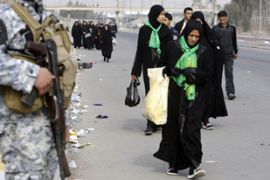Deadly blasts hit Iraq Karbala city
At least 40 people killed and 140 others injured in attacks on Shia pilgrims.

In a statement, Al-Maliki said that the two groups failed to ignite sectarian strife and destabilise the country with the attacks on pilgrims.
Conflicting reports
| in depth | |||||||||||||||
|
Shortly after noon, a parked car bomb exploded on a road clogged with pilgrims 10km east of one of three main entrances to the holy city of Karbala, two health ministry officials said.
The explosion sent throngs of pilgrims running down the highway and straight into the path of a suicide car bomber who detonated a second vehicle, they said.
An Iraqi police official gave a different version of events, saying two mortar rounds struck the area, driving pilgrims into the path of the suicide car bomber.
Such conflicting accounts are common in the chaotic aftermath of bombings in Iraq.
On Monday, at least 54 people were killed and more than 100 injured in the same city when a suspected female bomber blew herself up among pilgrims.
‘Forces of darkness’
Saad al-Muttalabi, an adviser to the Iraqi Council of Ministers, blamed Friday’s attacks on “the forces of darkness” of al-Qaeda and former Baathists.
“These forces are bent on trying to destroy democracy, the achievements of the people of Iraq and the aspirations for peace and rebuilding the country,” he told Al Jazeera from Baghdad.
“It is very sad that we see some forces are still backing those murderers in creating a large scale of incidents in which people are killed.”
Friday blasts took place despite tight security measures.
Around 30,000 troops and police were deployed to protect millions of pilgrims who poured into the city in the past 10 days.
Two units of counterterrorism forces were also sent to the city from Baghdad, the capital.
Motorbike-propelled carts had been banned from the city. Twenty-five medical teams and 10 mobile clinics have been deployed with 65 ambulances on call.
